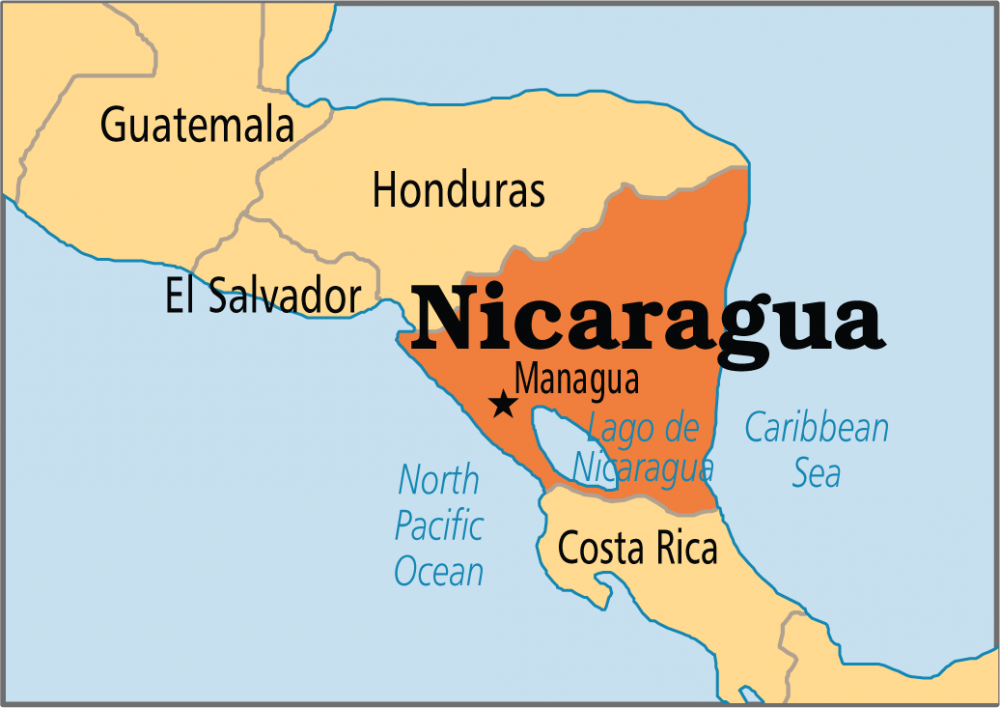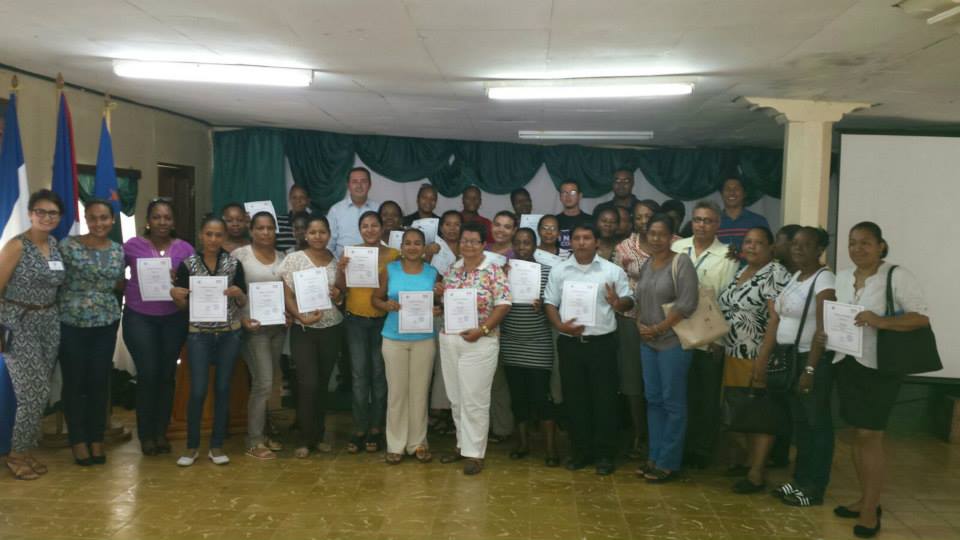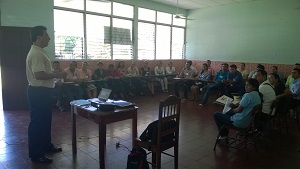|
 Let me share with you some sad facts of my country: We are the
second poorest country in Latin America and the salary of a high school
teacher of English is almost $200 a month. But I don’t want to focus
this article on these terrible facts. I want to share with you my
experience as President of the National Association of Teachers of
English in my country. I was elected for the term of 2014–2015, and I
was re-elected for two additional years. I have seen the necessity of my
colleagues in every single region we visit--the lack of resources, and
trainings are everywhere. I have lived and experienced the same
situations; I started teaching in 1988 when I was only 18. I was not
graduated. It was the worst year of the civil war in my country. There
were not enough teachers of English; they hired me because they needed
more personnel for the public schools. I started without any experience,
but my passion for teaching made me adapt to the needs of my students. I
did my best; I used not only a piece of chalk or a board, I used all of
the materials in my surroundings. I prepared my plans without books; my
students helped me by bringing newspapers, old magazines, and all types
of resources to my class. I survived and I am still teaching. Let me share with you some sad facts of my country: We are the
second poorest country in Latin America and the salary of a high school
teacher of English is almost $200 a month. But I don’t want to focus
this article on these terrible facts. I want to share with you my
experience as President of the National Association of Teachers of
English in my country. I was elected for the term of 2014–2015, and I
was re-elected for two additional years. I have seen the necessity of my
colleagues in every single region we visit--the lack of resources, and
trainings are everywhere. I have lived and experienced the same
situations; I started teaching in 1988 when I was only 18. I was not
graduated. It was the worst year of the civil war in my country. There
were not enough teachers of English; they hired me because they needed
more personnel for the public schools. I started without any experience,
but my passion for teaching made me adapt to the needs of my students. I
did my best; I used not only a piece of chalk or a board, I used all of
the materials in my surroundings. I prepared my plans without books; my
students helped me by bringing newspapers, old magazines, and all types
of resources to my class. I survived and I am still teaching.
Some members of the board quit because they didn’t
like new changes and challenges
One of my goals as President
was to change the mentality of poverty for the teachers and encourage
them to grow as professionals and work really hard for their
professional development. Let me tell you that some members of the Board
decided not to work because they didn’t like the changes and the
challenges. I have seen other Boards in Latin America where some members
are just part of a list and use the association to add to their
curriculum vitae.
Training new leaders is the key
We visited all the regions and created chapter leaders. We
trained these leaders to support their colleagues, identify their needs,
and suggest the types of training for their regions; now they are the
ones in charge of the groups of teachers in their cities, rural areas,
and departments.
The American Embassy in Nicaragua has been supporting the
regionals and national conference; we have involved the private sector
and organizations to support these teacher trainings around the country.
The trainers and volunteers who share their experience with the
teachers of the different regions come from Private Institutions and
universities.
Members of the board have to be ACTIVE and EFFECTIVE partners
Little by little, we have seen changes: Now the teachers are
willing to learn, to accept challenges, and they have a different vision
of their professional development.
I have learned that being part of the members of the Board is
not only to read surveys, sign cheques, and attend the national
conference. A member of the Board has to be there: next to the teachers,
experiencing the same needs, in the classroom with students, and part
of the teacher’s lessons.
We have discovered so many things we need to improve in
Nicaraguan classrooms. We know we have to improve language skills,
curriculum, etc. We have also discovered that our colleagues have dreams
and goals, and we are doing our best to be there when they accomplish
them. 
Teachers receiving their
certificates of participation during a regional conference

Teachers during a training session, department of Chinandega
Members of our association do not pay any fees during the
regional conferences. Members pay a fee only for the national conference
($10 for the two-day conference).
We receive donations of books and materials for the teachers.
You cannot imagine the meaning of bringing a simple book to a rural
area; it means a lot for a group of 50 students in one
classroom.
During my participation in Toronto TESOL Convention, The
President of Colorado TESOL gave us an opportunity: One member of our
association could participate in the Colorado convention. We selected
one teacher from a public school to be the representative of Nicaragua.
However, we had a big problem: This teacher did not have a visa. We
talked to the American Embassy and they solved the problem. The teacher
went to the United States. This experience was wonderful for this
teacher. Most importantly, he came back to share his experiences with
his colleagues and students. He talked about U.S. culture, food,
teachers, lessons, and families.
Nicaragua needs a bilingual labor force in this 21st century.
Our association is working with other institutions to reach this goal.
It is not impossible, it is just another challenge, and another
opportunity.
If you accept to be a member of a Board of any teachers’
association, it means that you are a leader, you must be next to the
teachers, their needs, and their students. You must listen and advise,
train teachers to be leaders, encourage them to be fighters of their
goals, and teach them to learn from their mistakes. We need more than
Board members—teachers need LEADERS.
During the first national conference during my term as
President in 2014, more than 500 teachers attended. In 2015, 640
teachers attended and in July 2016, 720 teachers attended the
conference.
It has been teamwork; Nicaraguan teachers are real soldiers of
peace, soldiers of sharing knowledge, and soldiers of perseverance. They
are willing to learn for their own benefit, for the benefit of their
students, and for the benefit of our nation.
Franklin Téllez has been working as a teacher of
English for more than 25 years. He has taught all levels: children,
teens, adults, businesses, and ESP. He was the former Academic Director
of the Binational Center in Nicaragua. He was recently re-elected
President of the Nicaraguan Association of Teachers of English and he is
President of the Teachers Associations of Central America and the
Caribbean TESOL Affiliates. He has been training teachers around
Nicaragua and Central America for more than 15
years. | 
